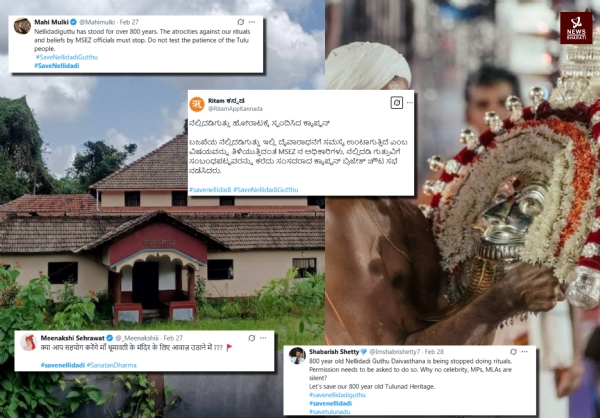Fight to #SaveNellidadi Guttu: A Social Media Movement Gaining Momentum
Twitter is flooded with posts, urging authorities to recognize the plight of Nellidadi Guttu and take corrective measures before it is too late.
Total Views |
For nearly two decades, the villagers of Nellidadi Guttu, a small hamlet in Karnataka’s Mangalore, have been striving to reclaim their place of worship. With no other recourse left, they are now turning to the people of India, urging mass support to help them fight for their sacred land. This is not just a local struggle; it is a battle to preserve their cultural and religious identity.

A Legacy Under Threat
Tribal communities across India have long faced pressure from religious conversions, leading to an identity crisis for many. However, the tribes of Tulunadu have fiercely protected their Hindu roots, resisting multiple waves of cultural encroachments. Their unique traditions and customs demand safeguarding against any attempts to dilute their heritage.
Now, the 800-year-old legacy of Nellidadi Guttu is at risk of being erased due to the Mangalore Special Economic Zone (SEZ) Project. The primary question remains—why are the villagers being denied the right to worship their revered Goddess, Jumaadi?
The Struggle for Religious Rights
Since 2006, the Karnataka Industrial Area Development Board (KIADB) has held control over the land of Nellidadi Guttu for SEZ development. The villagers, having lost their homes and livelihoods, now demand at least the restoration of their ‘Daivas’—their guardian deities.
The impact of the film Kantara has familiarized millions with the sacred tradition of ‘Daiva Aradhane,’ shedding light on the significance of ‘Daivas’ in Tulu culture. Now, the villagers are leveraging this newfound awareness to seek mass backing for the revival of the Jumaadi temple.
What Is Happening in Nellidadi Guttu?
Nellidadi Guttu, with its rich 800-year history, is on the verge of being wiped out to make way for industrial expansion. The villagers, displaced since 2006, have only one plea—to ensure that their Goddess’s temple remains untouched.
When the KIADB acquired the land, the entire village was vacated for SEZ development. While they have come to terms with losing their homes, they are determined to prevent the erasure of their religious heritage. A petition has been submitted to both central and state governments, but the response has been largely indifferent. However, a recent surge in social media activism has brought renewed attention to their cause.
Voices from the Ground
Villagers have expressed their concerns through media channels, emphasizing the spiritual significance of their land:
“ In the case of Nellidadi Guttu, the Deity is on one side and the holy well is on the other. The 198 Tirtha wells are as sacred as the deity. Even if the Deity is moved, the well cannot be relocated. Therefore, the government should consider the villagers’ demand as a special case”
“ During the last Sankranti celebrations, the company imposed a ban on entering the temple for divine services. It is disheartening that we now have to seek permission from a third party to offer flowers and water to our most sacred deity. The time has come for us, the people of Tulu Nadu, to unite and fight for the identity and existence of Nellidadi Guttu ”
Broken Promises and Unmet Agreements
According to reports, during discussions about relocating 22 households in Nellidadi Guttu, the Mangalore SEZ Company assured villagers that temple rituals—including daily offerings, Sankramana, Diwali, Chauthi, Ashtami, Mari Utsav, Bandi Utsav, Chavadi Nema, and rites for deceased family members—would be permitted. A similar assurance was given during a meeting chaired by the District Collector in December 2016.
Despite these promises, MSEZ officials later prohibited religious activities. When villagers requested permission for Sankrama Seva on February 12th, they were informed that this would be the last permitted ritual and that all future worship would be banned.
A Call for Sustainable Development
Local farmers have proposed an alternative approach, suggesting that the government focus on agricultural development rather than industrial expansion. They have called for the region to be declared a “Special Agricultural Zone” instead of an SEZ, emphasizing the importance of food security and ecological sustainability.
The Power of Social Media
With traditional media offering limited coverage, social media influencers from Mangalore and beyond have started amplifying the villagers’ concerns. Twitter is flooded with posts, urging authorities to recognize the plight of Nellidadi Guttu and take corrective measures before it is too late.
(Here, pictures of tweets and social media posts supporting the cause would be included.)
क्या आप सहयोग करेंगे माँ धूमावती के मंदिर के लिए आवाज़ उठाने में ??? 🚩#savenellidadi #SanatanDharma pic.twitter.com/WhFsBWG8SX
— Meenakshi Sehrawat (@_Meenakshiii) February 27, 2025
#savenellidadi #SaveNellidadiGutthu pic.twitter.com/L2Tf92Wve2
— Sukesh Mavilakochi (@Sukheshyadav) March 1, 2025
An 800-year-old legacy is on the brink of extinction. The villagers of Nellidadi Guttu, #Mangalore have fought for 18 years to protect their sacred land. Now, they seek public support. Why? Read on #SaveNellidadi @PMOIndia @narendramodi @BJP4Karnataka @Tejasvi_Surya @CTRavi_BJP
— Himali Nalawade (@HimaliNala) March 4, 2025
What Can Be Done?
The villagers of Nellidadi Guttu need national attention and widespread support to protect their sacred land.
Nellidadi Guttu’s struggle is not just about land—it is about preserving a civilization, a culture, and a legacy that has survived for centuries. If left unheard, it will set a dangerous precedent for other indigenous communities facing similar threats.
--

